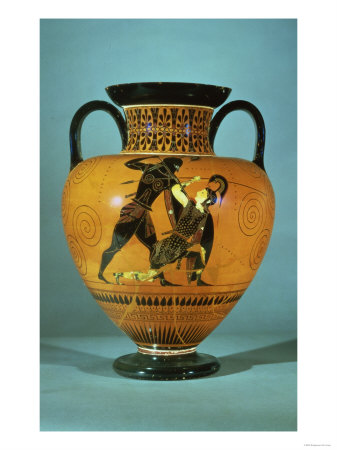Ceramics - Greek Amphora
amphora, ancient vessel form used as a storage jar and one of the principal vessel shapes in Greek pottery, a two-handled pot with a neck narrower than the body. There are two types of amphora: the neck amphora, in which the neck meets the body at a sharp angle; and the one-piece amphora, in which the neck and body form a continuous curve. The first is common from the Geometric period (c.900 bc) to the decline of Greek pottery; the second appeared in the 7th century bc. The height of amphorae varies from large Geometric vases of 5 feet (1.5 metres) to examples of 12 inches (30 centimetres) or even smaller (the smallest are called amphoriskoi). The average normal height is about 18 inches (45 centimetres). Amphorae, which survive in great numbers, were used as storage and transport vessels for olives, cereal, oil, and wine (the wine amphora was a standard Attic measure of about 41 quarts [39 litres]) and, in outsize form, for funerals and as grave markers. Wide-mouthed, painted amphorae were used as decanters and were given as prizes.Black Figure Neck Amphora Red Figure Neck Amphora
Red Figure Neck Amphora





Those are really unique because not only are they art, they're used for their lifestyles. i like the art on the outside, i think we should do that, not only just glaze but paint on it like that
ReplyDeleteThe history is very interesting and I am excited to make one of these pots.
ReplyDeleteLooks like that will be quite the challenge. I look forward to attempting one of these.
ReplyDelete- Blake Hall
These are jars are so unique and different than most pots now.
ReplyDeleteJordan Fischer
I am really excited to make the pot! I think it's going to be a challenge but it will be fun! My mom will love it and it would actually look good in my house!
ReplyDeletethese pots look difficult but fun! Im excited to attempt to make them
ReplyDeleteolivia Boggess
It seems difficult to make a symmetric pot but I am excited.
ReplyDeleteThese look hard to make but I am excited to make one.
ReplyDeleteThe history behind the pots are very neat. I really like the different paintings on the outside and cant wait to start making one!
ReplyDelete~Bailey Good
Can't wait to get my hands on some clay and just erect the greatest Greek pot ever. Yeehaw
ReplyDeleteI love that pot and that is the one I am planning to create.
ReplyDeleteEmily Edwards
I love how there's a story of life told in the art. It amazes me how they made them look so picture-esque with their ancient methods of clay working.
ReplyDeleteGabby Lindau